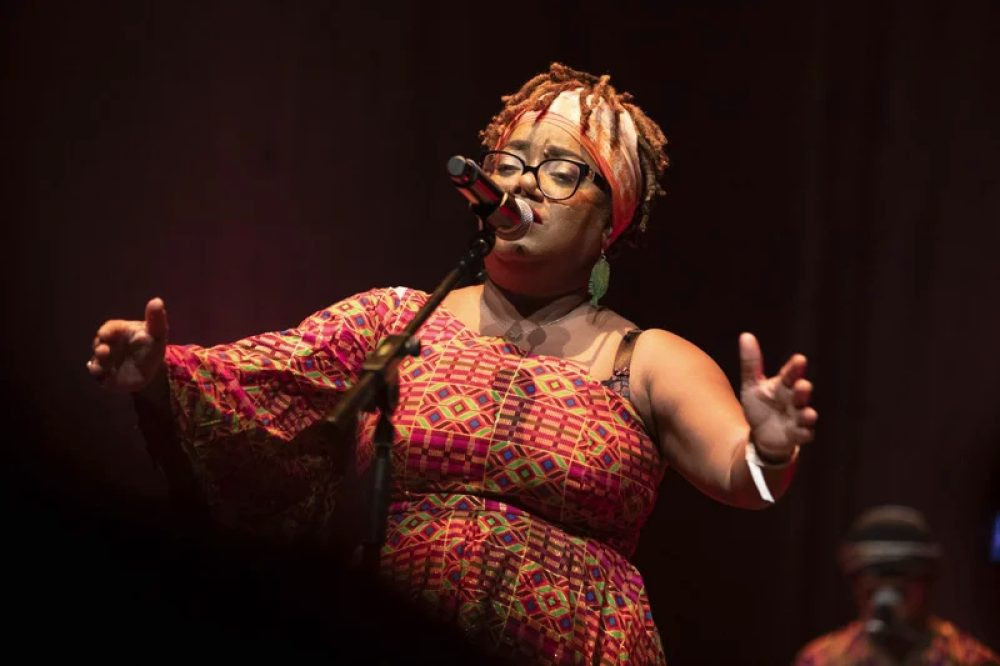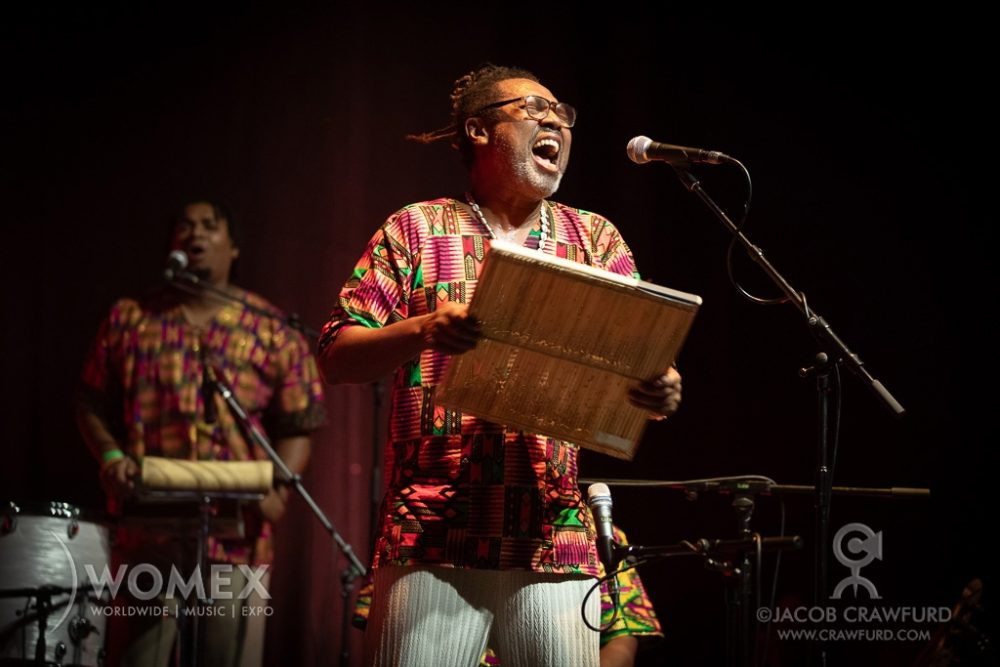Votia, a captivating family band hailing from Réunion Island, first enchanted audiences at Montreal’s Nuits d’Afrique in 2018. Their performance, a mesmerizing blend of voices and traditional percussion instruments, most notably the kayamb (a reed shaker), transported listeners to the historical “kabars.” These clandestine gatherings were vital spaces where enslaved people, and later freed individuals, would come together to dance and celebrate to the rhythm of maloya, the island’s soul-stirring traditional music. Hidden from the watchful eyes of slave owners and French colonial authorities, these kabars were sanctuaries of cultural expression and resistance.
The opportunity to witness Votia’s captivating performance once more arose at their WOMEX showcase in Manchester, England, last year, reaffirming the enduring power of their music.
At the heart of this musical family is singer-songwriter Marie-Claude Lambert-Philéas, carrying the legacy of her father, the iconic maloya musician Gramoun Lélé. “Family band” is not just a label; it’s the essence of Votia, with Marie-Claude sharing the stage with her husband, brother, cousin, and children. Maloya itself holds a distinguished place as a UNESCO Intangible Cultural Heritage of Humanity, a testament to its profound cultural significance. Marie-Claude eloquently described maloya in 2018 as “the traditional music of Réunion… the music of slaves that is expressive, like the blues. It expresses your feelings, your day-to-day life, good luck and misfortunes.”
During WOMEX, we had the privilege of sitting down with Marie-Claude for an insightful conversation, facilitated by a translator, offering a deeper understanding of their music and heritage.
Your father, Gramoun Lélé, is a legend in Maloya music. Was it his wish for you to follow in his footsteps?
Absolutely. It’s more than a wish; it’s a Family Tradition Song, a legacy passed down through generations. A transmission of our cultural soul, you might say.
Are the songs you perform primarily traditional Maloya pieces?
The unique sound and style that defines our music are deeply rooted in my father’s innovations. He infused a modernity into maloya that was distinct from what came before. So, while our songs are anchored in tradition, they also incorporate a rich tapestry of influences – Asian, African, and Madagascan – reflecting the diverse cultural currents that shape Réunion Island itself. We intentionally stay true to our heritage by playing exclusively with traditional instruments.
Maloya has been described as having elements of “vodoun chants.” Is there a connection to the Vodou traditions found in the Caribbean and Benin?
The common thread is perhaps the trance-like quality inherent in both musical forms. But it’s equally akin to the blues in its raw emotionality. Our songs are narratives of daily life, journeys, and the spectrum of human emotions. While a spiritual dimension may be present in some pieces, others are simply celebrations of our culture and lived experiences.
What is it like to create and tour music with your family?
Working with family is a natural extension of our lives; it’s more harmonious than collaborating with strangers. This familial approach is part of the maloya tradition, just as it was with my father’s band and now with Votia. I learned everything about music from him, within this family context.
It must be challenging at times, especially keeping an eye on the children while touring?
(Laughing) Of course! It adds another layer to the experience, but it’s all part of the journey and the family tradition song.
 Marie-Claude Lambert-Phileas of Votia performing at WOMEX 2023, Manchester, England, highlighting the passion of family tradition song in Maloya music.
Marie-Claude Lambert-Phileas of Votia performing at WOMEX 2023, Manchester, England, highlighting the passion of family tradition song in Maloya music.
Maloya’s history is intertwined with the island’s colonial past. For years, it was suppressed and performing it was illegal. Now, you’re sharing it globally. What does this global recognition mean to you and the tradition?
Our mission is to carry maloya music to the world stage, to share its power and beauty with everyone. It’s vital that the world hears it. The essence of the music itself has remained unchanged, a pure expression of our heritage. Now, both the language of maloya and the tradition itself are under the protection of UNESCO, safeguarding our instruments and songs. We are dedicated to preserving it in its authentic form.
Speaking personally, I must say I deeply appreciate the cuisine of Réunion.
(Smiling) The food and the music of our island are two sides of the same coin; they evoke the same feelings, the same connection to our home. Cooking is like playing music; it’s an act of creation and sharing.
 Votia band members playing traditional Maloya instruments at WOMEX 2023, Manchester, England, showcasing the rich sounds of family tradition song.
Votia band members playing traditional Maloya instruments at WOMEX 2023, Manchester, England, showcasing the rich sounds of family tradition song.
Given that many Western audiences may not understand the Creole language of your lyrics, what kind of feedback do you receive? Do you feel the emotional messages and stories embedded in the family tradition song of Maloya are successfully conveyed?
Emotion transcends language. We transmit our stories through the feeling in the music, and it resonates with audiences regardless of linguistic understanding. That feeling is received and returned to us, creating a powerful exchange. Beyond words, there’s a deep connection to the earth inherent in maloya. The story of maloya is the story of the earth, the enslaved people, the sugar cane plantations – it’s a music profoundly rooted in the earth. As human beings, we are all connected to the earth, and when people hear maloya, they instinctively feel that connection. Maloya is, at its heart, a song of the earth, a family tradition song that speaks to universal human experiences.
The rouleur drum, central to maloya, embodies this connection. Its wooden base represents the heartbeat of the earth. The drum skin, made from animal hide, gives a second life to the animal. Through this skin, we make the animal speak again through music, completing a cycle of life and expression.
I understand you have a new album forthcoming?
Yes, it’s due out this spring and it’s titled Vié Kaz, which translates to “The Old House.” This place holds immense significance for us. Vié Kaz is our father’s house, a humble dwelling where I grew up with my fifteen siblings and learned from my father. The album and title song, “Vié Kaz,” are an ode to this place, the birthplace of our music, where everything began. Rehearsals would start at 6 pm and continue late into the night. This is how the Gramoun Lélé family, and now Votia, lives and breathes music. In this old house, my father recorded his first album, and it’s where we continue to rehearse and create our own albums. It’s our spiritual home. “Vié Kaz” is also the name of one of the singles from the album.
Réunion has been proactive in addressing climate change. Does this resonate in your music?
Yes, deeply. Another song on the album, “Zoli Péi,” celebrates the incredible natural beauty of Réunion Island, which provides everything we need. As an island nation, we are particularly vulnerable to climate change. We live in rhythm with the planet, and changes in the north are immediately felt in the south. There was a time of local industry that brought prosperity, but those times are fading. It’s a challenging period, but the island’s beauty endures.
Another song, “Volkan,” draws a powerful metaphor, comparing people to a volcano. “On our island, there is a volcano. It rains heavily, but the volcano never dies, never goes out.” People may try to bring you down with negativity, but like the volcano, you remain resilient, strong, and alive. This is the spirit we embody, like the enduring volcano of Réunion, fueled by the family tradition song.
Thank you so much for sharing your story and music.
Thank you.
